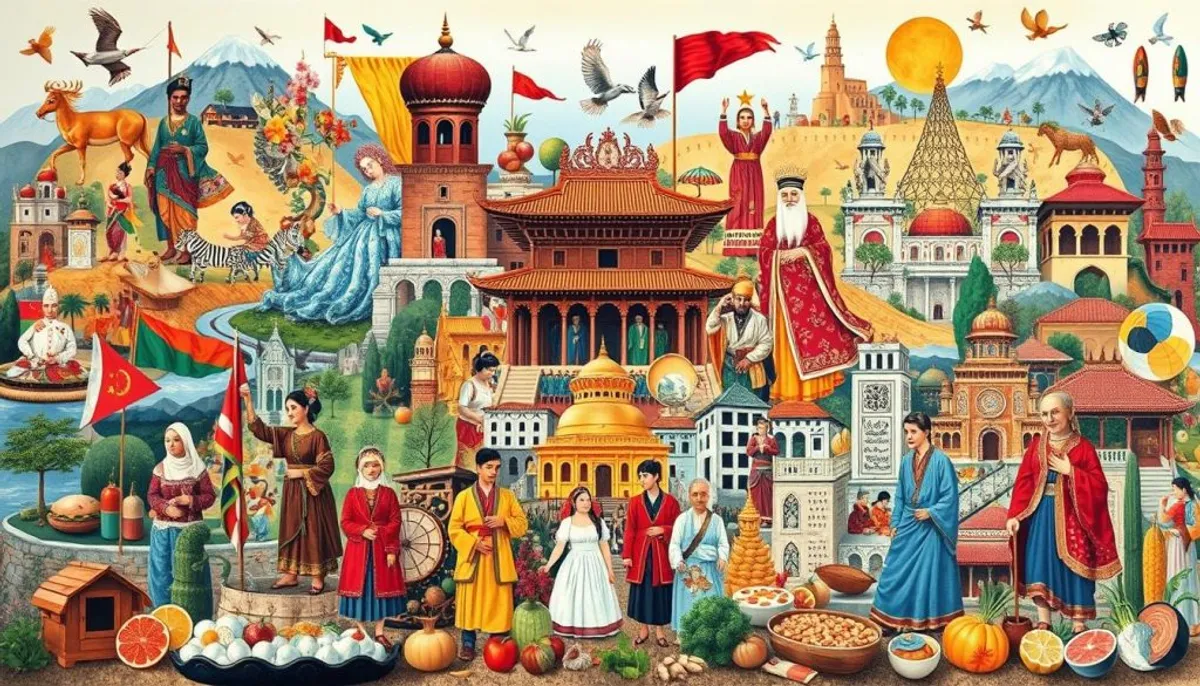Philosophy encourages us to consider the comparison of cultures. This complex inquiry highlights major ethical and social issues, particularly regarding historical events such as the fall of Constantinople. It urges us to examine our own prejudices and to revisit our understanding of the world.
In the face of a diversity of cultures that is constantly increasing, it is essential to explore the foundations of our judgments about other cultures. Is the notion of cultural superiority relevant, or does it simply reflect our prejudices?

Statistics show that many French speakers feel deeply connected to their community of origin. This trend influences our perception of other cultures. It can lead to ethnocentric attitudes, even to the exclusion of those perceived as “barbarians” or “savages.”
Let us explore together the various aspects of this fascinating philosophical question. We will examine reactions to cultural differences and the criteria for evaluating cultures. This reflection will help us better grasp the richness of human diversity.
Ethnocentrism and Cultural Judgment
Ethnocentrism, a fundamental concept in the study of intercultural relations, shapes our perception of other societies. It profoundly influences our cultural judgment and our understanding of human diversity.
The Definition of Ethnocentrism According to William G. Sumner
In 1906, William G. Sumner, an American anthropologist, introduced the term “ethnocentrism.” He defines it as the tendency to consider one’s own culture as the center of reference. This attitude often leads to judging other cultures through the lens of one’s own values and norms.
The Psychological Foundations of Cultural Rejection
Cultural rejection finds its roots in deep psychological mechanisms. Human beings tend to be wary of the unknown and to value what is familiar to them. This natural inclination can lead to a hierarchy of cultures, where one’s own is perceived as superior.
Historical Manifestations of Ethnocentric Attitude
History is full of examples of ethnocentric attitudes. The ancient Greeks referred to anyone who did not speak their language as “barbarians.” Later, during the discovery of the Americas, Europeans often viewed indigenous peoples as “primitive.” These cultural judgments had dramatic consequences on the course of history.
- Ethnocentrism is universal and spontaneous
- Any culture can claim superiority according to its own criteria
- Ethnocentrism is a major obstacle to intercultural understanding
Encountering the Other: Between Fascination and Rejection
The dynamics of intercultural encounter compel us to reflect deeply on our identity and our perception of the other. This complex interaction manifests in Western thought, marked by an oscillation between curiosity and mistrust in the face of difference. This tension reveals the depth of the questions raised by otherness.
The Shock of Initial Intercultural Encounters
The first interactions between distinct cultures often provoke shock. The study of AUPELF in the 1980s on the teaching of French illustrates this phenomenon. Only British, German, and French teachers participated, leaving out Spanish, Italian, and Portuguese ones. This selection reveals the inherent biases in our perception of the other, highlighting the limits of our understanding of otherness.
The Example of the Papuans of New Guinea
The discovery of the Papuans of New Guinea by the Leahy brothers in 1930 serves as an emblematic example of intercultural encounter. This experience sparked both fascination and misunderstanding, highlighting the challenges of communication between radically different cultures. It illustrates the complexity of intercultural interactions and the challenges they pose.

The Question of Otherness in Western Thought
Otherness occupies a central place in Western philosophical reflection. Claude Lévi-Strauss highlighted the frequent denial of humanity towards those considered “savages.” This tendency is reflected in the writings of Montaigne, who expresses 98% rejection towards certain attitudes in the name of Christian religion, while showing a 75% interest in the indigenous peoples of the New World in his comparative anthropological exploration.
The encounter with the other oscillates between attraction and rejection, shaping our cultural identity. This dynamic process influences our perception of ourselves and others, underscoring the complexity of intercultural interactions in an increasingly connected world.
Can We Say That One Culture is Superior to Another?
The question of cultural superiority has been at the heart of philosophical and ethical debates for centuries. The comparison of cultures raises complex questions about the criteria for evaluation and the moral implications of such comparisons.
The global influence of Western culture is an undeniable fact. Its scientific and technological advancements have contributed to improving the quality of life and life expectancy in many regions of the world. However, this dominance is not the result of a spontaneous process, but often the outcome of historical factors such as colonialism.

Philosophy invites us to question the very idea of cultural superiority. The concept of ethnocentrism, the tendency to judge other cultures by our own standards, leads us to a biased evaluation. This approach ignores the richness and diversity of different cultural aspects.
Debates in anthropology and ethnology challenge the notion of superior culture. Thinkers like Lévi-Strauss argue against this idea, emphasizing the importance of cultural relativism. Globalization and massive migrations have transformed the cultural question into a political issue, touching its substance and place in the public space.
Ultimately, the comparison of cultures raises profound ethical questions. It compels us to reflect on the tension between respecting cultural diversity and seeking universal values, a central challenge for our globalized society.
The Criteria for Evaluating Cultures
The evaluation of cultures is a complex subject, raising many questions. Claude Lévi-Strauss, a French philosopher and ethnologist (1908-2009), made a significant contribution to this debate. After World War II, UNESCO posed a crucial question to the international scientific community. This question concerned the contribution of different human groups to civilization.
The Distinction Between Factual Judgments and Value Judgments
In the evaluation of cultures, it is essential to distinguish factual judgments from value judgments. The former are based on objective observations, while the latter involve subjective assessments. This distinction is crucial to avoid ethnocentric biases in our understanding of cultural differences.
Cultural Relativism and Its Limits
Cultural relativism, a concept developed by anthropologists like E. B. Tylor and Sapir, suggests that all cultures are relative and can only be judged within their own context. Lévi-Strauss emphasizes that this principle is a methodological rule rather than an absolute judgment. He warns against applying cultural relativism outside of its ethnological context, reminding us that our cultural judgments are inevitably influenced by our own culture.
Universal Values Versus Cultural Particularisms
The tension between universal values and cultural particularisms remains at the heart of the debate on the evaluation of cultures. Lévi-Strauss reminds us that “The barbarian is primarily the man who believes in barbarism.” This reflection invites us to rethink our criteria for evaluating cultures, seeking a balance between respecting cultural diversity and recognizing common values shared by humanity.
RelatedRelated articles


